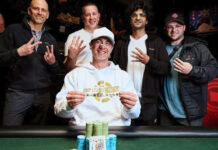Short-deck poker is one of the most exciting new formats in poker. Also known as six-plus poker, the format has seen explosive growth around the world after first debuting in high-stakes Asian cash games a few years ago. The game is similar to regular, full-deck no -limit hold’em except that it is played with a 36-card deck, with the deuces through fives of each suit removed. As a result of these cards being omitted, there are a few resulting rule changes: Flushes beat full houses, and aces can play both as the highest card and as a five in order to complete a nine-high straight (A-6-7-8-9).
International excitement for the game reached a whole new level in 2018 when several nosebleed stakes events on the Triton Super High Roller Series tour adopted the format. The largest of all these tournaments was a $1,000,000 HKD (approximately $128,000 USD) buy-in held in Montenegro. A total of 103 entries were made in the event to create a massive prize pool of roughly $12.6 million USD. In the end, the largest share of that money was awarded to eventual champion Jason Koon. The 33-year-old American poker pro earned more than $3.6 million USD as the champion, the largest payday of his tournament career.
Koon recently finished eighth in the 2018 Poker Masters $10,500 short deck event, the first tournament utilizing the format to ever be broadcast on PokerGO. Card Player caught up with him just days after that event to learn more about the game that is sweeping the globe.
“Short deck was developed in Asia, mainly because in full-deck poker you can go a long time without a good hand and that isn’t the most fun for someone who is trying to sit down for a few just a few hours and play some poker,” said Koon when asked about why the game has caught on so quickly. “In short deck, you always have a good hand. You basically always hit the board, there are essentially no bricks with the deuces through the five removed.”
Another reason that players looking for action have taken to the game is the fact that equities run much closer in short deck than they usually do in full deck no-limit hold’em.
“An example is, say you’re playing full deck no-limit hold’em. If you flop an open-ended straight draw, you are somewhere in mid 30 percent likelihood of making your hand by the river,” explained Koon. “In short deck, you’re more like a pure coinflip to get there by the river.
“Since straights happen so often in this format, you can take a hand like 10-9 and it’s in great shape against a hand like ace-king. In full deck, 10-9 is in fine shape, but it’s not in great shape against ace-king. So people really enjoy this game because it’s an action-based format,” continued Koon. “You get to play a lot of hands, and that is the right way to play the game. You can gamble and even if your hand selection isn’t the best, strategically, you still have a shot at winning a lot of money because the equities run so close.”
For those interested in trying out the format for themselves the next time they get their home game together, Koon has a few tips. “You should play with an ante only structure. Everybody antes one, the button antes two and the action starts to the left of the button. So what often happens is that everyone is getting an incredible price, and frequently there are multiple people who limp in and you end up playing four or five-way pots, which doesn’t happen often anymore in full deck no-limit hold’em.”
“It’s a ton of fun to play so many people post flop, its kind of weird and challenging when you can play so many hands. There is still a lot of room for skill, even if there is sometimes a lot of preflop flipping, you are playing multi-way pots and if you can read hands well and stay out of trouble you are going to make a lot more money than somebody who is going to overplay top pair or other hands that are good in full deck but are less strong in short deck.”
Poker has seen a number of fads come and go in recent years, but Koon seems to think that this time might be different. “This is a great game, and I think that it has a bright future,” says Koon.












